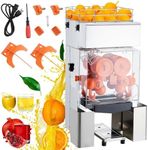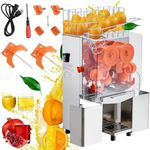Buying Guide for the Best Breville Juicer
Choosing the right juicer can make a significant difference in your daily routine and overall health. When selecting a juicer, it's important to consider your specific needs and preferences, such as the types of fruits and vegetables you plan to juice, how often you will use the juicer, and how much time you want to spend on preparation and cleaning. Understanding the key specifications of juicers will help you make an informed decision and find the best fit for you.Type of JuicerThere are mainly two types of juicers: centrifugal and masticating (also known as cold press or slow juicers). Centrifugal juicers are faster and more convenient for quick juicing, making them ideal for busy individuals. They work well with hard fruits and vegetables but may not be as efficient with leafy greens. Masticating juicers, on the other hand, operate at a slower speed, preserving more nutrients and yielding more juice from leafy greens and soft fruits. They are perfect for those who prioritize juice quality and nutrient retention. Choose a centrifugal juicer if you need speed and convenience, and a masticating juicer if you value nutrient-rich juice and versatility.
Motor PowerMotor power, measured in watts, determines the efficiency and performance of the juicer. Higher wattage means the juicer can handle tougher fruits and vegetables with ease. For centrifugal juicers, a motor power of 700-1000 watts is generally sufficient for most juicing needs. Masticating juicers typically have lower wattage, around 150-250 watts, as they operate at slower speeds. If you plan to juice hard produce like carrots and beets frequently, opt for a juicer with higher motor power. For softer fruits and leafy greens, a lower wattage juicer will suffice.
Juice YieldJuice yield refers to the amount of juice extracted from fruits and vegetables. Masticating juicers generally produce a higher juice yield compared to centrifugal juicers, especially with leafy greens and soft fruits. If you want to maximize the amount of juice you get from your produce and reduce waste, a masticating juicer is the better choice. However, if you are more concerned with speed and convenience, a centrifugal juicer may still meet your needs despite a slightly lower juice yield.
Ease of CleaningCleaning a juicer can be a time-consuming task, so it's important to consider how easy it is to clean the model you choose. Centrifugal juicers typically have fewer parts and are easier to clean, making them suitable for those with limited time. Masticating juicers, while offering higher juice quality, often have more components that require thorough cleaning. Look for juicers with dishwasher-safe parts or those that come with cleaning brushes to simplify the process. If you plan to juice frequently, ease of cleaning should be a top priority to ensure you stick with your juicing routine.
Feed Chute SizeThe size of the feed chute determines how much preparation is needed before juicing. A larger feed chute allows you to insert whole fruits and vegetables without chopping, saving you time and effort. Centrifugal juicers often have wider feed chutes, making them more convenient for quick juicing. Masticating juicers usually have smaller chutes, requiring more prep work. If you prefer minimal preparation, look for a juicer with a wide feed chute. However, if you don't mind spending a bit more time on prep for higher juice quality, a smaller chute may be acceptable.
Noise LevelNoise level is an important consideration, especially if you plan to juice early in the morning or late at night. Centrifugal juicers tend to be louder due to their high-speed operation, which can be disruptive in a quiet household. Masticating juicers operate at slower speeds and are generally quieter, making them a better choice for noise-sensitive environments. If noise is a concern for you, opt for a masticating juicer to enjoy a quieter juicing experience.
Durability and WarrantyDurability and warranty are indicators of the juicer's longevity and the manufacturer's confidence in their product. Look for juicers made with high-quality materials like stainless steel and BPA-free plastics. A longer warranty period, typically ranging from 1 to 15 years, provides peace of mind and protection against defects. If you plan to use your juicer frequently, investing in a durable model with a comprehensive warranty is advisable to ensure it withstands regular use and lasts for years.
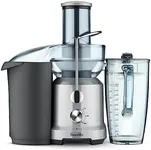
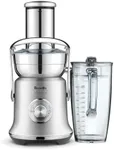
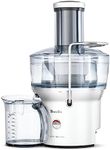
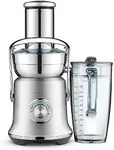
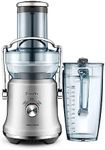
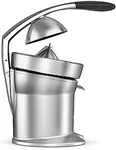
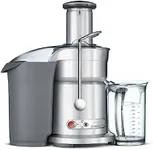
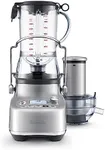


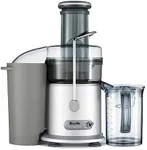
![[ Unique Version] AZEUS Centrifugal Juicer Machines, Juice Extractor with Germany-Made 163 Chopping Blades (Titanium Reinforced) & 2-Layer Centrifugal Bowl, High Juice Yield, Easy to Clean, Anti-Drip,100% BPA-Free, ETL Listed, Catcher & Brush Included](https://images-proxy.bestreviews.guide/YH8uicRpieLdrZa-sgG8kQ5I4C4=/0x150/https://m.media-amazon.com/images/I/41-6+tJcTdL._AC_CX679_.jpg)
